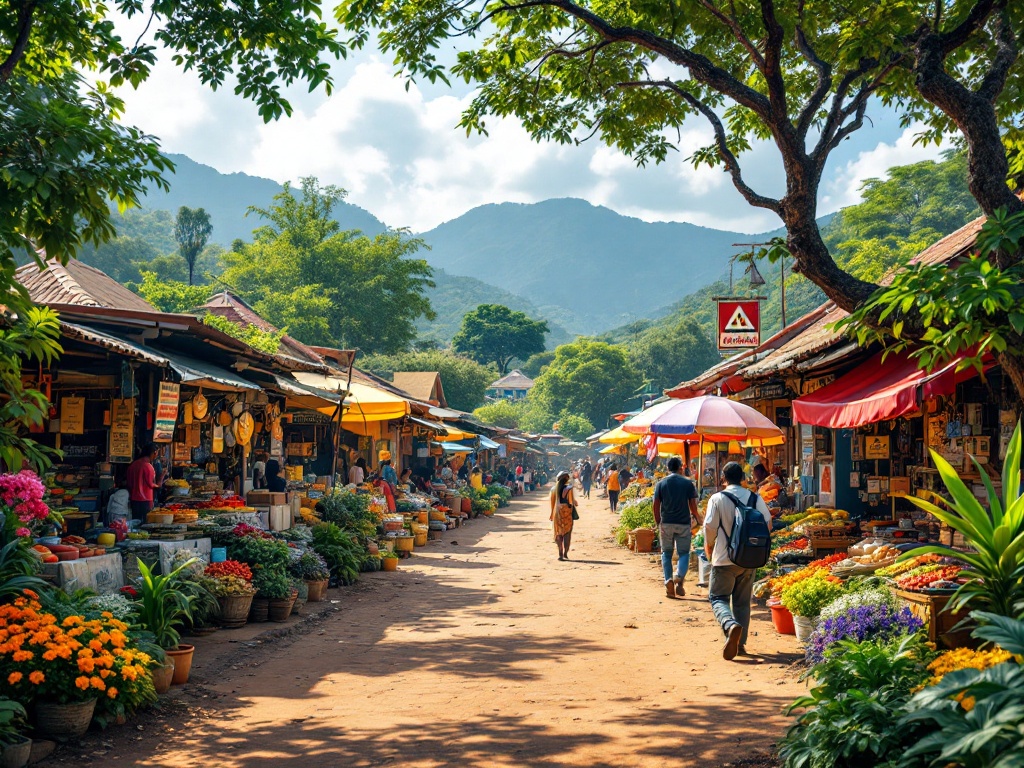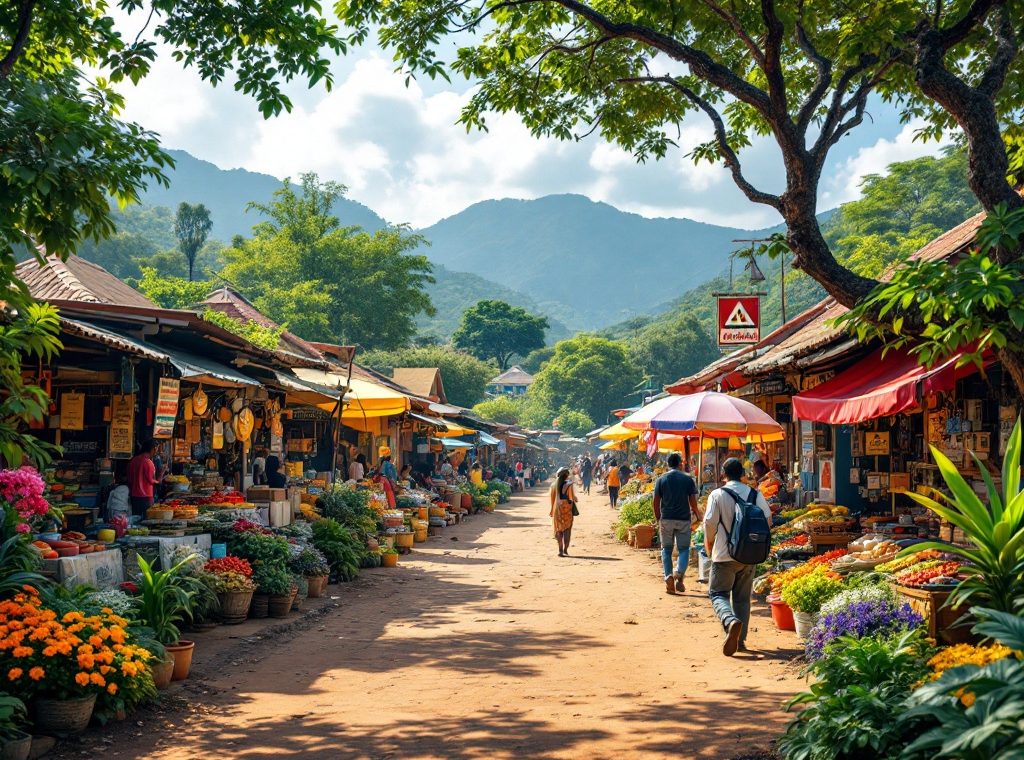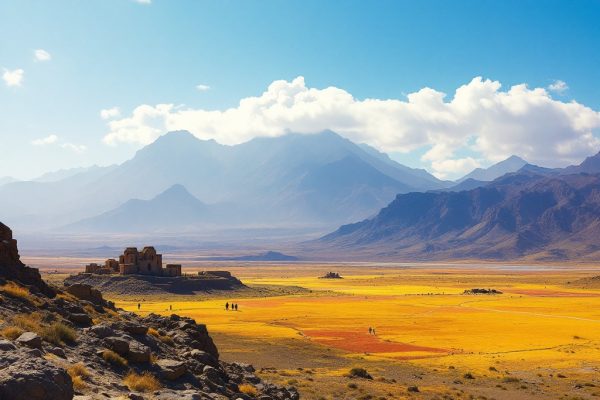What Dangers Might a Traveler Face in West Africa
Planning a West African adventure? From vibrant cultures to stunning landscapes, West Africa offers unforgettable experiences. However, navigating safety and health is crucial for a smooth trip. This guide provides essential knowledge on crime, political instability, health risks like malaria and yellow fever, and natural hazards. Learn practical safety tips, from protecting your valuables to staying informed about potential threats. Prepare yourself for a safe and enriching journey. Start exploring now!
Important information

- Crime, including petty theft, robbery, and assault, is a concern, especially in urban areas. Be vigilant, avoid displaying valuables, and stick to well-lit areas.
- Terrorism and kidnapping pose serious threats in some regions. Stay informed about current events and avoid risky areas.
- Infectious diseases like malaria, yellow fever, and cholera are prevalent. Consult your doctor about necessary vaccinations and preventative measures.
- Political instability and civil unrest can disrupt travel. Monitor local news, register with your embassy, and maintain flexible travel plans.
- West Africa has diverse climates and potential natural hazards, including heavy rains, flooding, and droughts. Research the specific regional weather patterns and pack accordingly.
Understanding Travel Safety in West Africa
Safety
Petty theft and scams are common in urban areas, so be wary of pickpockets. Violent crimes like robbery and assault, while less frequent, do occur. Be aware of political instability and unrest in certain regions, as well as the potential for terrorism and kidnapping. Avoid traveling at night and consider joining a group for added safety.
Transportation
Road conditions are often poor, with reckless driving prevalent, leading to frequent accidents. Public transport can be unreliable. Research reputable transportation services in advance.
Health
Infectious diseases are a risk, so vaccinations and careful preparation are essential. Consult your doctor about necessary precautions.
Environment
West Africa has diverse climates and potential natural hazards. Stay informed about local conditions and plan accordingly.
Stay informed about local conditions. Check for travel advisories and news updates regularly.
Avoid demonstrations and large gatherings. These can be unpredictable and potentially dangerous.
Secure your valuables. Use hotel safes and be discreet with expensive jewelry or electronics.
Thoroughly research specific destinations. Understand local customs, laws, and potential risks.
Heed local advice. Locals can provide valuable insights into safe areas, transportation options, and potential hazards.
What Dangers Might a Traveler Face in West Africa?
Traveling to West Africa can be an enriching experience, but it’s essential to be prepared for potential safety and health risks. Crime is a concern in some areas, particularly in urban centers. Be vigilant against muggings, bag snatching, and theft. Terrorism and kidnapping are serious threats in certain regions, so thorough research and awareness of current events are crucial. Civil unrest and political instability can also disrupt travel and create unsafe conditions. Health risks are significant. Malaria, yellow fever, and cholera are prevalent, making vaccinations and preventative measures essential. Heavy rains and flooding during the wet season can disrupt travel plans, so factor this into your itinerary. For a safe and enjoyable trip, research your destination thoroughly, follow local advice and heed travel advisories, and prioritize safety guidelines.
Safety Concerns
- Crime: Be aware of muggings, bag snatching, and theft, especially in urban areas.
- Terrorism and Kidnapping: These are serious threats in specific regions. Research and stay informed about current events.
- Civil Unrest: Political instability can disrupt travel and create dangerous situations.
Health and Natural Hazards
- Diseases: Malaria, yellow fever, and cholera are prevalent. Vaccinations and preventative measures are crucial.
- Wet Season: Heavy rains and flooding can disrupt travel plans.
For a safe trip, research thoroughly, follow local advice, heed travel advisories, and prioritize safety guidelines.
Crime and Security Concerns
West Africa presents certain safety risks. Petty crimes, such as muggings, bag snatching, and pickpocketing, are common, so be vigilant in crowded areas and on public transport. More serious incidents, such as robberies and assaults, also occur, particularly in urban centers. Avoid displaying expensive items and, after dark, stay in well-lit areas. Increased awareness will significantly enhance your safety.
Safety Tips for West Africa
- Be aware of your surroundings, especially in crowded areas and on public transport.
- Avoid displaying expensive jewelry, electronics, or large amounts of cash.
- Stay in well-lit areas after dark.
Common Crimes
- Petty theft (muggings, bag snatching, pickpocketing)
- Robberies
- Assaults
Risks of Terrorism and Kidnapping
West Africa poses real dangers for travelers, including terrorism and kidnapping, which particularly target foreigners. However, staying vigilant and implementing safety precautions can significantly reduce these risks. Always be aware of your surroundings.
Dealing with Civil Unrest and Political Instability
Avoid protests and rallies, as these can quickly turn dangerous.
Stay informed about potential unrest by monitoring local news.
Register with your embassy or consulate for updates and support, as political instability can disrupt travel and create risky situations.
Maintain flexible travel plans to adapt to changing circumstances.
Health Issues and Precautions
Traveling to West Africa requires awareness of potential health risks. Several diseases are prevalent, including malaria, yellow fever, typhoid fever, cholera, and meningitis. Before your trip, consult your doctor about recommended vaccinations and necessary precautions.
Consult your doctor. Discuss recommended vaccinations and necessary precautions for your trip to West Africa.
Protect yourself from insect bites. Use mosquito nets and insect repellent to minimize exposure to diseases like malaria and yellow fever.
Be cautious about food and water. Stick to bottled water and be mindful of food preparation practices to avoid food and waterborne illnesses.
Ensure you have travel insurance and a first-aid kit. Medical facilities can be limited in West Africa, so these are highly recommended.
Natural Hazards and Climate Challenges
West Africa experiences extreme weather, from droughts to floods, and even dust storms carried by the Harmattan winds. So, before traveling, check weather forecasts and pack accordingly. In the event of a weather emergency, reach out to local authorities or your embassy for assistance.
Crime and Security Concerns
Traveling in West Africa requires vigilance due to safety concerns. Petty theft, such as pickpocketing and bag snatching, is prevalent, especially in urban areas. More serious crimes, like armed robbery and carjacking, also pose a threat in certain countries. To mitigate these risks, avoid displaying valuables and stick to well-lit areas at night. Thoroughly research your destination beforehand, understanding the specific regional risks. Always heed local advice regarding travel restrictions. This precaution could prevent significant problems.
Safety Advice for Traveling in West Africa
Petty Theft: Pickpocketing and bag snatching are common, particularly in urban areas, so be mindful of your belongings.
Serious Crime: Armed robbery and carjacking are a threat in some countries. Research specific areas and exercise increased caution.
Safety Precautions: Avoid displaying valuable items like jewelry or expensive electronics. Stick to well-lit and populated areas, especially at night.
Pre-Trip Planning: Research your destination thoroughly, understanding the regional risks. Consult local authorities and heed their advice on travel restrictions.
Risks of Mugging, Bag Snatching, and Theft
Be aware of petty theft, pickpocketing, robbery, and assault, especially in crowded areas. Stay vigilant and avoid displaying valuables.
Stick to well-lit streets at night.
Check in with local authorities and heed travel advisories for valuable safety information.
Safety Tips for Women Travelers
Share your travel plans with a trusted contact. Keep them updated on your location throughout your trip.
Refrain from walking alone at night, especially in areas you are not familiar with or that are poorly lit. Choose safe transportation methods such as taxis or ride-sharing services.
If you encounter any aggressive behavior, respond assertively and firmly.
Dress modestly and respect local customs to minimize unwanted attention.
Choose accommodations that have good reviews and are located in safe neighborhoods.
Internet Scams and Fraud Prevention
Traveling carries the risk of online scams such as phishing emails, fake websites, and romance scams. Business email compromise and advance-fee fraud are also serious concerns. However, you can take steps to protect yourself. Verify information using official sources and avoid sharing personal details online. Be careful with financial transactions, especially on unsecured networks like public Wi-Fi.
Common Online Travel Scams
- Phishing emails, which try to trick you into giving up personal information.
- Fake websites that mimic legitimate travel booking sites.
- Romance scams that prey on those seeking companionship while traveling.
Other Online Threats
- Business email compromise, where scammers impersonate businesses to steal money.
- Advance-fee fraud, which involves requests for upfront payment for goods or services that never materialize.
Safety Tips for Online Travelers
- Verify Information: Always double-check information with official sources like government websites or reputable travel agencies.
- Protect Personal Data: Avoid sharing sensitive details like passport numbers or credit card information on unsecured websites or social media.
- Secure Financial Transactions: Exercise extreme caution when conducting financial transactions online, especially when using public Wi-Fi. Consider using a virtual private network (VPN) for added security.
Risks Associated with Taxi and Public Transport
Traveling in West Africa presents safety concerns, especially with taxis and public transport. Taxi passengers face the risk of robbery by their drivers, a serious concern for personal safety. Nigeria’s public transport system also poses significant safety challenges. Therefore, travelers should exercise extreme caution when using these services.
Risks of Terrorism and Kidnapping
Traveling safely in West Africa requires vigilance due to the threat of terrorism and kidnapping, especially for foreigners. Mitigate these risks by researching and relying on trusted sources and staying informed about dangerous areas.
Terrorism
Terrorist groups are active in several West African countries, often targeting public places such as transportation hubs and government buildings. Stay informed through reliable news and government warnings.
Kidnapping
Kidnapping for ransom is a serious threat in some areas. Avoid displaying valuables, be aware of your surroundings, vary your routines, and tell someone where you are going. If kidnapped, cooperation increases your chances of survival.
Consult Local and International News
Regularly check local and international news for security updates.
Check Government Travel Advisories
Refer to travel advisories from government websites and travel safety organizations.
Heed Official Warnings
Pay attention to official warnings and adjust your travel plans as needed.
Understanding Terrorism Threats
Staying informed about global terrorism is crucial for safe travels. Before any trip, consult your government’s travel advisories and keep up with international news for up-to-date information on potential threats.
Precautions Against Kidnapping
Maintain a low profile and avoid displaying valuable possessions such as jewelry or electronics.
Whenever possible, especially at night, travel with companions.
Inform a trusted friend or family member of your itinerary and estimated return time.
Be aware of your environment and listen to your instincts.
If a situation feels unsafe, leave immediately.
Monitoring Media for Threat Information
Staying informed is crucial for safe travels. Consult reliable sources such as government travel advisories, reputable news outlets, and local resources for potential threats. Official government websites and international news organizations are great examples of places to find crucial safety updates. By staying informed, you can travel smart.
Dealing with Civil Unrest and Political Instability
Research your destination thoroughly, avoiding areas with a history of protests. Demonstrations can escalate rapidly, endangering even onlookers.
Stay informed about local events by checking news reports and following the advice of local authorities. Registering with your embassy or consulate will ensure you receive updates and support.
Be aware that political instability can significantly impact travel plans, leading to border closures, curfews, and transportation disruptions.
Travel insurance offers crucial financial protection if your trip is canceled or interrupted.
Maintain a flexible itinerary to adapt to unforeseen changes. Preparedness is paramount for safe travels.
Avoiding Protests and Demonstrations
Public demonstrations can escalate into dangerous situations quickly, so it’s best to avoid them. Maintaining a safe distance from these gatherings is crucial for your well-being.
Impact of Political Instability on Travel
Political instability in West Africa poses risks to travelers. Protests and conflicts can erupt unexpectedly, so staying informed about local news is crucial. Steer clear of any areas experiencing unrest and register with your embassy for safety updates. Flexible travel plans are essential, as adaptability is key to navigating unforeseen circumstances. Here’s how to mitigate risks:
Monitor local news. Stay updated on current events and potential security risks.
Avoid unrest. Steer clear of areas experiencing protests or conflict.
Register with your embassy. Receive safety updates and assistance in emergencies.
Be flexible. Adaptability is key to navigating unforeseen circumstances.
Health Issues and Precautions
Traveling to West Africa requires awareness of potential health risks. Malaria is a significant threat. Other diseases such as yellow fever, typhoid fever, cholera, and meningitis are also present. Vaccinations are essential for safeguarding your health. Consult your doctor or a travel clinic for personalized recommendations, ensuring you’re protected against yellow fever, typhoid, and meningitis.
Consult a healthcare professional. Discuss your travel plans with your doctor or a travel clinic to receive personalized vaccination recommendations.
Get vaccinated. Ensure you receive necessary vaccinations for yellow fever, typhoid, and meningitis, along with any other recommended immunizations for travel to West Africa.
Be aware of malaria. Understand that malaria is a significant risk in West Africa, and take necessary precautions to prevent infection.
Know the other risks. Be aware of other prevalent diseases in the region, including yellow fever, typhoid fever, cholera, and meningitis.
Common Health Risks in West Africa
Planning a West African adventure? Prioritize your health. The region poses health risks, such as malaria, yellow fever, typhoid, and cholera. Vaccinations and travel insurance are crucial. Healthcare access can be limited, so pre-trip preparation is essential. Be mindful of food and water safety to avoid gastrointestinal issues. Careful planning ensures a healthy and enjoyable trip.
Consult your doctor about necessary vaccinations for malaria, yellow fever, typhoid, and cholera.
Secure comprehensive travel insurance that covers medical emergencies and evacuations.
Pack necessary medications and a well-stocked first-aid kit.
Research healthcare facilities available at your destination.
Be cautious about food and water consumption. Stick to bottled water and thoroughly cooked food.
Essential Vaccinations for Travelers
Planning a West African adventure? Protecting your health is crucial. Consult your doctor or a travel clinic about vaccinations for hepatitis A, typhoid, and yellow fever. They can advise on necessary vaccines and medications. Discuss malaria prevention strategies with your healthcare provider. These precautions will ensure a healthy and enjoyable trip.
Natural Hazards and Climate Challenges
West Africa presents diverse climates, from arid northern deserts to lush southern rainforests. Between November and March, the dry harmattan wind blows from the Sahara. Conversely, the wet season, from May to October, brings heavy rainfall, often causing flash floods and landslides, particularly in coastal and mountainous areas. Droughts also significantly challenge some areas, disrupting travel and hindering access to essential resources.
Managing Weather-Related Travel Risks
Traveling to West Africa requires preparation due to the diverse climates and potential hazards. Before your trip, research the specific regional weather patterns, as both wet and dry seasons occur. Develop a comprehensive emergency plan, including evacuation routes and important contacts. Pack essential supplies such as water, food, and a first-aid kit. Be aware of potential hazards, including extreme weather conditions like heavy rainfall, flooding, and landslides. Wildlife, such as snakes and insects, also poses risks. Remember to pack sun protection.
Emergency Support and Assistance
Contact your embassy or consulate immediately upon arrival for assistance and register for updates and support.
Research local emergency numbers in advance.
Ensure you have travel insurance with medical evacuation coverage.
Practical Tips for Ensuring Personal Safety
Minimize risks by leaving valuable items like expensive jewelry and electronics at home. Be cautious, especially after dark, and avoid walking alone in isolated areas. If confronted by a criminal, prioritize your safety by not resisting. Report any incidents to the local police and research areas known for intercommunal violence to avoid them.
Safeguard your valuables by using hotel safes for passports, cash, and other important documents. Carry separate photocopies of essential documents as a backup.
Traveling with companions increases safety and discourages potential threats. Share your itinerary with a trusted contact at home and stay in regular communication with family or friends. Establish a designated meeting point in case of separation.
Exercise vigilance at ATMs and consider using money belts or hidden pouches for enhanced security. Never leave your belongings unattended, especially in public spaces.
Avoiding Street Crime and Intercommunal Violence
Be cautious, especially in crowded areas or at night.
Refrain from displaying valuable items like jewelry or electronics.
If confronted by a criminal, prioritize your safety and do not resist.
Traveling with companions can enhance your security.
Research and avoid neighborhoods known for unrest.
Traveling in Groups: Benefits and Safety
Traveling in a group enhances safety in West Africa in several ways. It deters potential threats, and in emergencies, assistance is readily accessible. Furthermore, shared awareness and mutual support in unfamiliar situations contribute to a safer travel experience.
Keeping Valuable Items Secure
Safeguard your belongings while traveling by taking these precautions:
Use anti-theft bags or backpacks with lockable zippers to deter pickpockets.
Carry money belts or hidden pouches for cash and important documents.
Avoid displaying expensive jewelry or electronics.
Utilize your hotel safe for valuable items.
Maintain heightened vigilance in crowded areas and on public transport.
Enjoy your trip!













